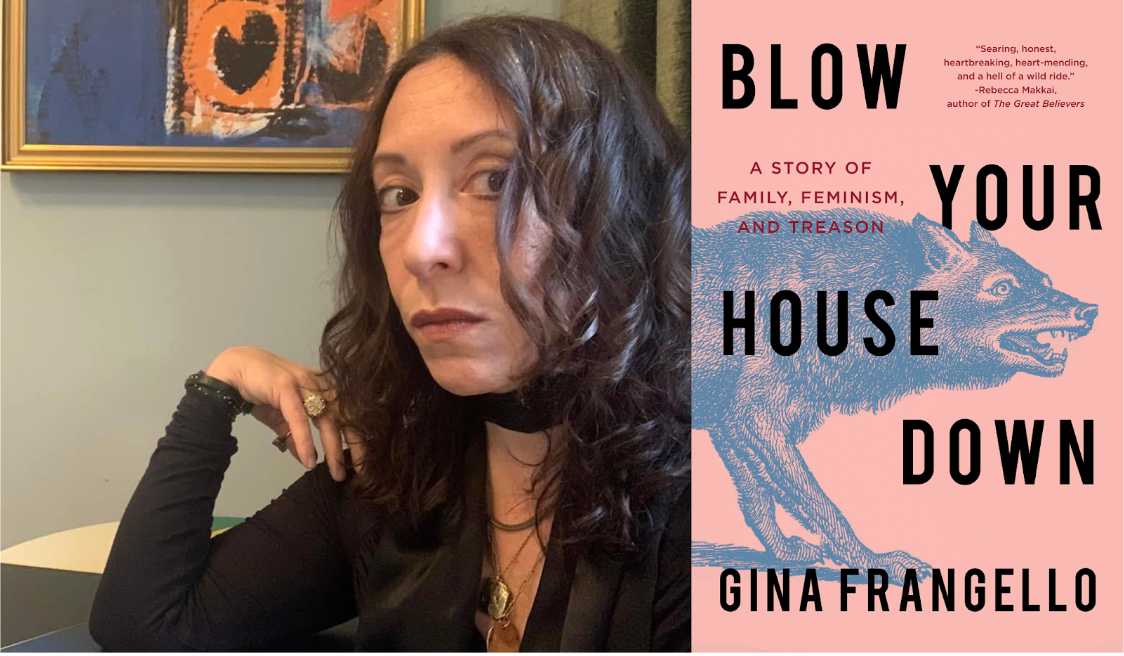Pity on the poor memoirist. The desire to dig up memories usually doesn’t come from a place of happiness. On top of that, readers may approach the genre with skepticism or a whiff of schadenfreude.
I can’t count how many times someone has said something like, “I don’t know how you do it. You must feel so exposed,” as if some writers are too broken or crazy to realize that they’ve just done a striptease in public. To be clear, a good memoir isn’t a public striptease.
But it is the criticism of memoirs that does the most damage to the art form (and it is an art form). Too often, a person’s life is judged and reviewed, not the quality of their writing.
Gina Frangello seems to know this, and in “Blow Your House Down,” her uneven and provocative book, she tries to protect herself from this kind of reaction.
I’m not sure I’ve ever read or even reviewed a memoir that got under my skin the way this one has. Just go ask my editor. I tried to get out of writing this review because I found myself harshly judging Frangello and writing notes like OMG, stop, and no!! in the margins.
Frangello has had a hard life, with a childhood full of violence and poverty and an adulthood spent trying to fix or escape that childhood.
She goes through physical pain, loses her best friend, takes care of her elderly parents, and, near the end of the book, gets a cancer diagnosis. The last thing I felt like doing was adding to her mountain of problems.
But that is me falling into the same critical trap. Vivian Gornick once said, “What happened to the writer is not what matters; what matters is what the writer can make of what happened.”
“Blow Your House Down” seems to be about a woman’s destructive love affair that destroys her marriage, family, and life, but it’s actually a feminist manifesto, and the author goes back and forth between revenge and justification that borders on self-congratulation, which are the two worst things you can do when writing about yourself.
She does this in ever-more-confusing loops, always coming back to the same descriptions, questions, and conclusions without ever digging deeper.
She starts by putting herself and her story into a sociological context, probably in an attempt to make it bigger by association: “You might have noticed that women’s anger is on the rise again,” she writes early on.
“It might be true to say that I’ve been waiting for this moment since sixth grade.” The problem is, Frangello feels like she may have missed the boat now that she is in her forties. “I am too old… beat to the punch. As women finally stand up as a group to complain about how men treat them, I am left without a red robe of victimhood.
Rather, I have cheated, lied, and hurt people. I have been selfish and driven by my own wants. In other words, I have behaved like a man, even though I am a mother, and so I may have lost my right to female rage.”
FAQs
What is the primary subject matter of Gina Frangello’s book, “Blow Your House Down”?
The book explores Gina Frangello's life experiences, including a childhood marked by violence and poverty and an adulthood of trying to escape those early experiences. She discusses her physical pain, losing a close friend, caring for elderly parents, and a cancer diagnosis. However, it also serves as a feminist manifesto and delves into the author's complex relationship with her gender and society's expectations of her.
How does the author, Gina Frangello, frame her memoir?
Frangello presents her memoir in the context of the broader sociological and feminist dynamics of our time, dealing with topics such as women's anger, societal expectations of women, and her struggle with those norms. She oscillates between justifying her actions and acknowledging their impact on others.
What is the criticism of memoirs discussed in the article?
The criticism mentioned in the article is that often in memoirs, a person's life is judged and reviewed rather than the quality of their writing. This criticism can do considerable damage to the art form.
What does the author mean by the “red robe of victimhood”?
The "red robe of victimhood" in the context of the memoir refers to Frangello's sense of not fitting into the societal narrative of victimhood, as she has also acted in ways that have caused hurt to others. She suggests that her actions have disqualified her from claiming female rage, as she has performed in ways typically attributed to the harmful actions of men.



